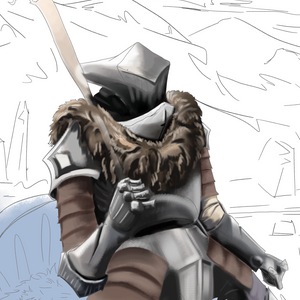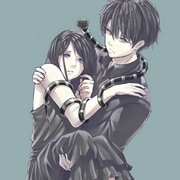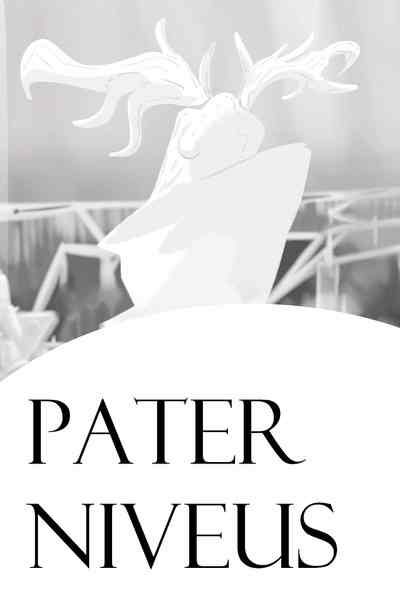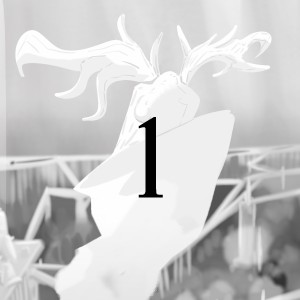Chapter 1
Once upon a time in a snowed-in town, there was a little girl called Annemarie. The town had been slowly buried under sheets upon sheets of snow as an endless winter set in swallowing spring, summer and autumn in heavy white clouds. Annemarie was alone at home often. Her parents were always at work, and nothing could be changed. Her parents’ work was important. Sometimes her parents came back early and cooked her dinner or told her good night. But when Annemarie woke up for school in the morning, she was alone again. Breakfast would have already been laid out for her on the table by her mother or her father. They always looked that at least one of their shifts allowed for preparing breakfast, lunch and dinner in advance for Annemarie.
Annemarie would eat up and hurry out of the house shortly thereafter. Her school bag already would be packed. Annemarie was always wrapped in thick winter coats and long colourful scarfs. She wore so many layers the buttons seemed to nearly pop of her coat. The outermost coat was stuffed so full it bulged making her look round as a ball. Like this, she would walk to and from school. It was a short trip of less than five minutes.
The the school was not far from her home, nor anybody else’s home. The snow had covered much of the town. Only the old core was kept accessible and inhabited. Day after day, year after year, the inhabitants had tried to keep the many roads and roofs clear, but it had proven to be too exhausting. The inhabitants kept huddling closer and closer together until every important building was found around an old central marketplace made of red brick. The buildings around this red city centre were also made of red brick and the adjacent buildings, which formed a second ring around the first were of red brick too. Annemarie lived in an outermost third half ring of inhabitable buildings made of the same material. This half-circle was placed on the other side of the marketplace and Annemarie had to cross the red centre to go to school.
Annemarie would have been sad and disappointed to walk over the city centre alone every day, but outside she was not alone. The city centre was always filled with people no matter what time of day. The vendors, entertainers, customers and other kids knew little Annemarie and they knew of her plight too.
This was without counting how fond the elderly were of Annemarie. Her parents had taken her with them to work sometimes when she had yet to go to school. One time they took her to a retirement home where the local heating had failed, which had flooded the cellar with scalding water. Her parents were no menials or maintenance workers. They were studied engineers and mechanics instead, but this did not stop them from accepting work they deemed important, and their community was thankful for that.
Annemarie had been a welcome distraction to the inhabitants of the apartment block. She brought them warm coffee or tea from across the road when asked and played games with them, while they huddled next to the pool of hot water waiting for the work to be done. Years later Annemarie was still remembered by the retirees, their family and the nurses and clerks who were present that day.
On her way to school, Annemarie would walk past many looks of approval. And after Annemarie would walk past pedestrians draped in clothes the colour of flowers and entertainers dancing with deceptively youthful steps, she would arrive at the school.
The school was a stout building flanked by workshops on one side and the town hall on the other. It was a place of learning and remembering with murals of lush nature and cloudless skies. Annemarie was told that such things were in the past. But her teacher also said that Annmarie was learning so that such scenes could return one day. Thus, every child learned many skills to find their place in the red centre.
Annemarie already knew what she wanted to become; everybody knew. She had skipped a year after all. She didn’t want to be alone at home all the time. It especially hurt her a lot when her parents had to work long past her sleeping time and she didn’t see her parents for days. One day Annemarie had an epiphany and since then she wanted to become an engineer like her parents. If they couldn’t come to her she would come to them.
Annemarie had worked hard for it, and when she was told she could skip a grade, she did with everybody around her agreeing with her decision. But after she had skipped class, Annemarie had been more isolated. The already little Annemarie stuck out like a sore thumb between her older classmates. They didn’t feel like her peers as much as her previous class. There had been problems now and then, but Annemarie was always encouraged to chase her goals. Now she thought the glory of being an engineer would make her struggles worth it.
Annemarie’s parents worked on mysterious machines which breathed life into the red-brick city centre and pumped warm lifeblood through its veins. There were other people which worked on those machines, but this was of little importance. For Annemarie, her parents were the most important. She looked up to them. Everybody was happy because of her parents, and she would join them in making everybody happy. Annemarie knew she wouldn’t be lonely anymore and many people encouraged her. There was always a need for more helping hands for handling complex pumps and fragile mechanisms.
Universal love and gratefulness for Annemarie’s parents were in the air and she felt pride swelling her heart every time she thought of how much her parents helped other people. Sometimes Annemarie even imagined how everywhere in the brick town centre was part of her intimate home because her parents worked on it for all their life. In a romantic sense, she lived in between her parents’ lives’ work. Annemarie liked this thought a lot, and she thought of it often when she felt down again. When she did, Annemarie could envision the warmth of the centre stream into her house. She imagined how the warmth of her house mixed with the warmth of the marketplace. Finally, she imagined how everything flowed into her. It was as if the red bricks of each building or road could melt all the ice in the world. But this was not all there was to the world.
At school, they not only learned how to read, write and do math but also about the past. They learned nature and of many odd creatures Annemarie had never seen once in person. Creatures, animals, so was Annemarie told, which had fled far south when the long winter started many generations ago. Sometimes Annemarie found it odd why her ancestors had not left the city before everything but the red centre was snowed in. And other times she figured that maybe they didn’t know that the snow would keep on falling for so long. Sometimes she couldn’t wait for an answer anymore and would ask her teacher. But the answers were always apparently accurate but so complex that Annemarie couldn’t understand it, or too simplified to be accurate according to her teacher. “Well,” Annemarie would think, “I’ll still be here tomorrow, I maybe I’ll understand it then.” And so, Annemarie lived through her school days. Surrounded in admiration, love and pride but walking to and from school alone.












Comments (1)
See all